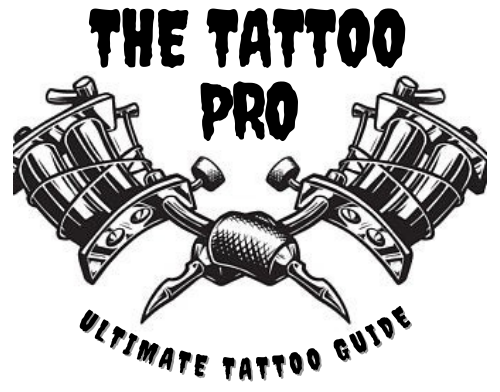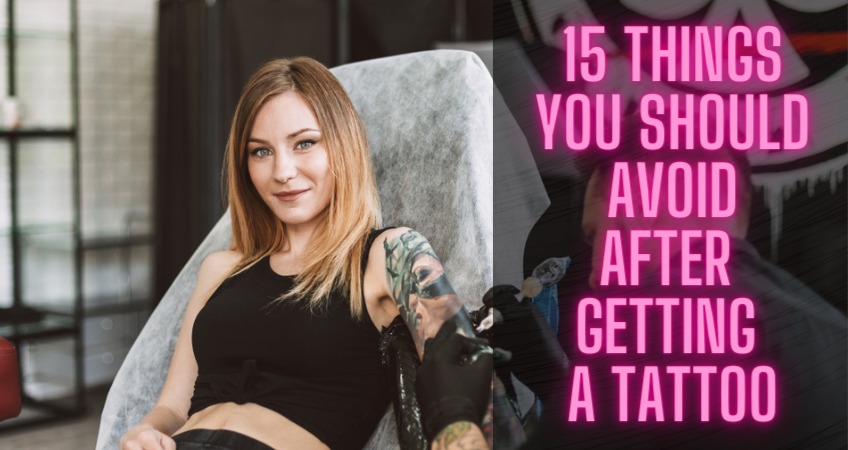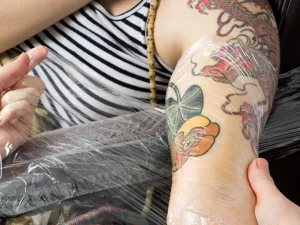Table of Contents
How To Take Care of Tattoo
Tattoos are permanent imprints on our bodies. The procedure, from the beginning to its healing process to its aftercare, each has its needed importance. To keep one’s tattoo fresh and vibrant for a longer period one should follow the basic tattoo aftercare tips. One should avoid a few things after getting a tattoo. What to avoid after getting a tattoo? This is one of the most asked queries by tattoo lovers. The solutions available are diverse with numerous options. In this blog we are about to mention the basic and the most important tattoo aftercare tips and information, one should consider after getting a tattoo.
For many, the tattoo artist suggests the basic precautions that are needed after the tattoo is done. Apart from them, there are some general precautions when followed that would help in the easy healing of the tattoo wound and can help keep the tattoo looking vibrant for years. They are:
| What to Avoid After Getting a Tattoo | Why It Should Be Avoided |
| Direct Sunlight: | Exposing your tattoo to direct sunlight can cause fading and damage to the tattooed skin. Protecting it from the sun helps maintain its vibrancy. |
| Swimming and Soaking: | Immersing your tattoo in water, especially in pools, hot tubs, or natural bodies of water, can increase the risk of infection and hinder the healing process. |
| Picking or Scratching: | Picking, scratching, or peeling the scabs or dry skin can lead to scarring, color loss, and potential infection, affecting the overall quality of your tattoo. |
| Tight or Irritating Clothing: | Wearing tight or abrasive clothing can rub against the fresh tattoo, causing irritation, friction, and potential damage to the healing skin. |
| Heavy Exercise and Sweating: | Intense physical activities and excessive sweating can introduce bacteria to the tattooed area, prolonging the healing process and increasing the risk of infection. |
| Chemicals and Harsh Products: | Harsh chemicals, fragrances, and lotions can irritate the healing skin and interfere with the tattoo’s healing process. Use gentle, tattoo-friendly products. |
| Touching with Dirty Hands: | Touching your fresh tattoo with dirty hands increases the risk of infection. Keep your hands clean and only touch your tattoo after washing them thoroughly. |
1. “Celebrate your tattoo, but don’t forget the aftercare”
Tattoo lovers are so excited about getting their tattoo that they completely omitted the practice of tattoo aftercare. After the antiseptic bandage and the excess ink is wiped away that is when the tattoo aftercare process starts.
Tattoo artists prefer the dry healing method, even following this method you need to wash your tattoo with soap at least 3 times a day. This active treatment would help clean the wound and remove any unwanted germs so that it heals in a proper way.
2. “It’s a no-no to sunlight”
Exposure to sunlight, especially direct sunlight, can affect your tattoo ink and skin in a negative way. It is therefore preferred by tattoo experts to get inked during the time when you can stay indoors for a few days after the tattoo is done. If you are on vacation it’s advisable to not visit the tattoo shop with a tanned body. The best time is to get the tattoo right before your journey back home. In case you are a working professional or a student, and you need to go out, you should apply a considerable amount of sunscreen with an SPF balance of 30 and more.
3. “You are allowed to glimpse but not to tickle, take the yield of, scratch or rub”
After a week or so as the tattoo starts drawing one can see the peeling and scabbing of the tattoo. This is a natural phenomenon of our body to heal the tattoo wound. The tattoo may look a little disoriented or not at its best, it’s a completely natural process. Actor stage one should not prod, scratch, poke or pick the tattooed skin. This is because if done in case of any unfavourable circumstances this pulls out the tattoo ink leaving scars, discolouration and in severe cases may lead to infection.
What to do in case you need to feel the urge to scratch?
Take a soft towel or a clean paper towel, just pat it dry after it comes in contact with water. When you feel the scratch do the same, pat the towel softly over the area. The ultimate aim here is to be gentle to your healing ink.
4. “No shave phase”
It is recommended to stop shaving until the healing process is done. It might take about a month. One must wait until the linework shedding is done and the scabs have fallen off on their own. This is because shaving over a fresh tattoo to remove the scabs without complete healing would in turn give way to various wounds and infections.
5. “Let the natural process heal the wound”
Many tattoo lovers can be seen using medicated ointments like Bacitracin and Neosporin. There is no doubt that ointment can help the body heal the wound. But for some skin types, it may reject it or create an allergic reaction causing serious rashes for tiny red spots.
But in a generalized view, medical ointments are used in medical situations. They are like a barrier between the atmosphere and the skin preventing the contact of any sort of unwanted bacteria. The moisture present in the wound does not come in contact with the oxygen, which is not good for the healing process.
Another reason why one should try to avoid medical ointment is most of the products are petroleum-based which makes them greasy that is hard to remove from the skin. This might irritate and forcefully remove the skin scab. At worst, it can also fade the ink due to excessive washing of the ointment from the area tattooed.
6. “Friendzone the water for a bit”
Water may not affect the tattoo much, but it can interfere with the process of healing or in some circumstances even cause infection if the water enters the tattoo wound. It would take more time to heal 10 can cause implications to the tissue underneath as well.
If you are a regular visitor to the swimming pool you should also take necessary precautions. The water contains chemicals and a lot of people use it. When having a fresh tattoo, one should avoid coming in contact with the substances available in the chlorinated water to avoid unwanted infections and rashes.
Washing the tattoo is fine but soaking it in water is not a good option. One should give at least three weeks or until the tattoo heals completely.
7. “Breathe freely, wear those comfy ones from your closet”
If you get a tattoo in an area that needs to be covered, make sure to let the tattoo breathe freely. Wearing clothes sticking to the skin may negatively disrupt the airflow leading to sweating, rubbing, and chafing.
If you are used to wearing tight-fit clothes, use those clothes that apply the technology to keep the moisture away from your skin and help the tattoo stay dry when working out or doing any other tough chores.
If you live in a cold climate it’s advisable to wear cotton fabric and in a hot or warm climate wear clothes that don’t come in rough contact with the tattooed skin.
Also Read Here: How To Remove a Tattoo
8. “Don’t treat it more than required”
Overtreatment of tattoos is never a good option. Overtreatment here implies over moisturization, excessive usage of soap, and similar. Moisturizing the tattoo area to heal is crucial when applying the wet healing method of tattoo aftercare. Using too much moisturizer than required is the main reason for infection as it restricts the speed of healing.
How To Perfectly Use It?
Take proper care of your tattoo. Apply only a thin layer and allow appropriate time for the lotion to work before putting it on the next application.
9. “Don’t sweat it out”
Sweating is a natural phenomenon one cannot do much regarding it. But excessive sweating is not a favorable condition during the initial few weeks after getting the tattoo.
The best remedy is to avoid hitting the gym or doing excessive workouts until the second peeling off the tattoo layer is complete.
10. “Keep the booze away for a bit”
Drugs, Cigarettes, and Alcohol, on the one hand, and getting a new tattoo, on the other don’t come hand in hand. When getting inked, one should avoid drugs, cigarettes, and alcohol. This is because when getting a tattoo we need to stay healthy and keep ourselves hydrated to keep our skin at its best.
11. “Say no to fondling”
One of the most important steps of tattoo aftercare is to avoid touching the tattoo. One should strictly not let others touch the tattoo as well. When there is a need to touch the fresh tattoo skin, make sure to use a paraben-free natural unscented soap to wash your hands before going on with the tattoo aftercare procedures.
12. “Stop the Re-bandaging”
Once the tattoo is done, the tattoo artist wrapped the tattoo in a bandage. It helps to protect the fresh wounds. The type of bandage varies with the tattoo type, similarly varies the tattoo aftercare process as well. Depending on the type of tattoo and the tattoo artist’s instruction the bandage can be removed between 4 to 24 hours after the tattoo is done.
13. “No to the fragrance soap bars”
It is advised to use a paraben-free, antibacterial, and unscented soap for your tattoo. As Fragrances can cause reactions to sensitive area like irritation, itching, rashes, etc. It is advised to use such shops for cleaning the tattoo at least twice a day for the bigger and smaller ones or as per the recommendation of your tattoo artist.
14. “No fusion of healing methods, choose one”
There are three ways to do tattoo aftercare:
- Wrap healing method
The wrap healing method refers to the method of keeping the tattoo covered in plastic until the healing is done. This is because plastic helps in faster healing by locking the natural moisture of the skin. One can uncover the plastic at the time of cleaning the wound.
- Wet healing method
The wet healing method is the most used tattoo aftercare ritual. In this method, one uses lotions, moisturizers, and salves to heal the tattoo.
- Dry healing method
The dry healing method refers to allowing the tattoo to heal on its own.
It is advised to choose only one healing method and in case of any issues, visit the tattoo artist or any Health Care professional to resolve the issue.
15. “What not to eat after getting your favourite tattoo”
When it comes to food there are a few restrictions, after getting a tattoo regarding the food items. The most common food that needs to be avoided is unhealthy foods, those foods high in fat content and sugar. Search foods can cause skin inflammation and hamper the healing process.
Following are some of a list of the food items one should avoid for the tattoos to heal faster.
- Alcoholic beverages
- Ice cream, ready-to-eat frozen meals, instant noodles, etc.
- Processed meat, pork items such as fresh and smoked sausage, ham, bacon, salami, etc.
- Readymade juices and sodas
- Artificial sweets, cookies, cakes, bars, and chocolates.
- This food item should be avoided for at least one week after getting tattooed.
The above-mentioned are the most important tattoo aftercare tips that one should consider without any fail. It will also make the healing process smoother, avoiding any kind of unwanted infections. It would help the tattoo ink penetrate the skin making the tattoo look more vibrant and attractive for a long time. Apart from this, the instructions of the tattoo artist should be also followed thoroughly!
FAQ’s
Can I expose my fresh tattoo to direct sunlight?
It is recommended to avoid direct sunlight on your fresh tattoo. Sun exposure can cause fading, discolouration, and damage to the tattooed skin. Keep your tattoo covered or use sunscreen with a high SPF to protect it from harmful UV rays.
Can I go swimming or soak in water after getting a tattoo?
It is best to avoid swimming or soaking in water until your tattoo is fully healed. Pools, hot tubs, and natural bodies of water can introduce bacteria and increase the risk of infection. Moisture can also prolong the healing process and affect the quality of the tattoo.
Is it safe to pick or scratch scabs or dry skin that forms on my tattoo?
No, it is crucial to resist the temptation to pick, scratch, or peel any scabs or dry skin that may form on your tattoo. Doing so can lead to scarring, color loss, and potential infection. Allow the scabs to heal and fall off naturally.
Should I avoid wearing tight or abrasive clothing over my new tattoo?
Yes, it is advisable to avoid tight or abrasive clothing that can rub against your fresh tattoo. Friction from clothing can cause irritation, discomfort, and potential damage to the healing skin. Opt for loose-fitting, breathable garments during the healing process.
Are there any specific products or chemicals to avoid on a fresh tattoo?
Yes, it is important to avoid using harsh chemicals, fragrances, and lotions on your fresh tattoo. These can irritate the healing skin and interfere with the tattoo’s healing process. Stick to gentle, tattoo-friendly products recommended by your tattoo artist.


